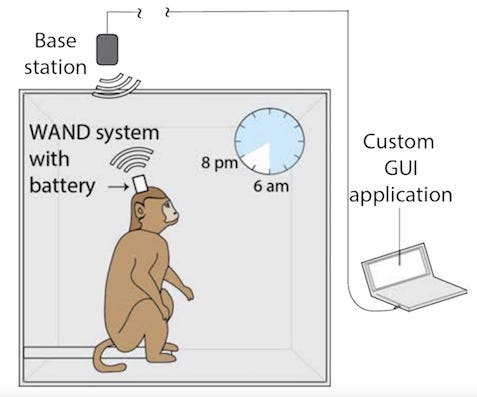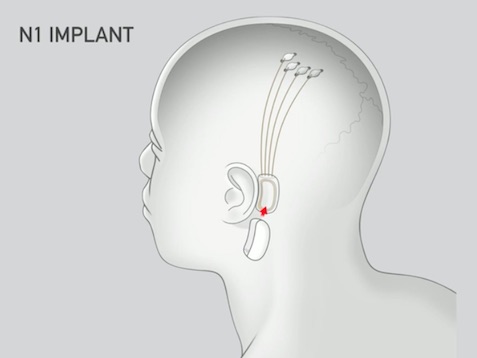Mind-reading devices are coming from Facebook, Elon Musk, and others. Here's their agenda.
By Mark Hurst • September 27, 2019
Mind-reading devices are on their way, thanks to Big Tech.
First, consider a recent news item showing an early attempt at mind-reading already in use.
• In this school in China, students wear brain-monitoring headsets. Data is sent to teachers and parents, to track who's not paying attention in class. (WSJ, Sept 19)
Note that the surveillance of neural activity is for the purpose of control. And it's being tested out on one of the most easily controlled populations: schoolkids. Once neural surveillance becomes more accepted, this type of control will spread to other populations.
Dystopian, right? But it's not just in China.
Zuckerberg and Facebook are also trying to get in your brain.
• Facebook just bought CTRL-labs, a startup promising to read neural activity (NYT, Sept 23): The aptly-named CTRL-labs (it's all about control!) is "exploring ways for people to communicate with computers using brain signals." The same day, Facebook's Andrew "Boz" Bosworth put it this way: "You have neurons in your spinal cord that send electrical signals to your hand muscles telling them to move in specific ways such as to click a mouse or press a button. The wristband will decode those signals and translate them into a digital signal your device can understand, empowering you with control over your digital life. It captures your intention so you can share a photo with a friend using an imperceptible movement or just by, well, intending to."
Because there's nothing better than allowing Facebook to (a) read your mind, (b) take its best guess at your intentions, and use that to (c) share your data with Facebook and its partners!
None of this is new, though.
• We learned in January that Zuckerberg is separately investing in "WAND" brain implants, as reported this past January in Business Insider. I recorded this 2-minute audio segment summarizing it (Jan 7 on WFMU). The journal Nature ran a paper on the device: here's the PDF, and here's the contextual info.
• Then, Facebook announced in July that they're getting closer to mind-reading (Business Insider, July 30), referencing this official Facebook post (July 30). See also Boz's Twitter post (July 30) about "a non-invasive wearable device that lets people type just by imagining what they want to say." This led me to record another 2-minute audio segment (Aug 12) about "Facebook's mind-reading helmet."

Above, monkey with Zuckerberg's WAND device attached (yes, this is for real: source)
With over 2 billion people under its daily influence, Facebook has clear reasons to want to initiate some sort of population-level control: like the Chinese-school headset, but much, much more effective.
But Zuckerberg isn't the only billionaire with "population-level" neural aspirations.
Elon Musk is getting into mind-reading, too.
Musk's mind-reading startup, Neuralink, claims to have created an implantable brain chip. I covered Neuralink on Techtonic, on July 29, drawing on two audio sources:
1. A brief interview of Elon Musk on Axios on HBO last year (Nov 25, 2018), in which Musk describes his device as "a chip and a bunch of tiny wires." Then he describes his true goal:
The long-term aspiration of Neuralink would be to achieve a symbiosis with artificial intelligence. And to achieve a sort of democratization of intelligence, such that it is not monopolistically held in purely digital form by governments and large corporations. ... Essentially, how do we ensure that the future constitutes the sum of the will of humanity? And so if we have billions of people with the high-bandwidth link to the AI extension of themselves, it would actually make everyone hyper-smart.
2. Neuralink's official launch event this past summer (July 16). After acknowledging that Neuralink would like to address medical conditions like spinal disorders, Elon Musk reminds everyone of his primary agenda:
Ultimately we can do a full brain-machine interface. Ultimately, yeah this is gonna sound pretty weird, but, achieve a sort of symbiosis with artificial intelligence. So. But this is not a mandatory thing. This is a thing you can choose to have, if you want. And this is something, I think it's gonna be really important at a civilization-level scale. I've said a lot about AI over the years, but I think even in a benign AI scenario, we will be left behind. And hopefully it is a benign scenario. But I think with a high-bandwidth brain-machine interface, I think we can actually go along for the ride. And we can effectively have the option of merging with AI. I think this is extremely important.

Above, diagram of Neuralink's brain implant (source)
• For more reading on Neuralink, here's a good overview: Elon Musk's Neuralink says it's nearly ready for human volunteers (Technology Review, July 17).
• Here's a list of several other BCI (brain-computer interface) devices (Axios, April 25). Neuralink and Facebook may be the biggest players in the space, but they're not alone.
Conclusions
With Zuckerberg and Musk - as well as Chinese companies and others - investing so strongly in mind-reading, what should we think about these new devices?
• This 2018 interview with Fred Turner is instructive (Rhizome/032c, July 30, 2018). Turner is a Stanford professor and author of From Counterculture to Cyberculture, a classic of Silicon Valley history. Here's his take on Big Tech brain devices.
Interviewer: Openwater, a consumer wearables startup, [is] trying to develop a ski cap to 'read your mind,' using data about oxygenated blood flow to the brain to read desires, thoughts. This is a claim made by the founder, formerly of Facebook and Google, on stage at conferences. She calls this move toward mind reading inevitable, a statement made with total confidence, and very little irony or pause. What is at play in some of the more possibly ethically dubious inventions in Silicon Valley? Is it a drive to own all human 'territory,' inside the body and out?
Fred Turner: I think that's absolutely what's at play. I was struck in the late '90s and early aughts as some of these early systems were being built, but how many of my friends would say, "Oh, you worry too much. The good hackers will protect us." And that's tremendously naive. . . . these folks imagine themselves as the archetypal American frontierspeople. The nature of the frontier is to be conquered is irrelevant; it's the conquering that matters. The actual westward push of Europeans stomped all over native peoples. Now, you see people like the founder you just described, quite happily, marching across our brain space as though it was just the latest in open, organic American fields to be conquered. We're the natives in this story and that's terrifying.
• For more reading on this idea, see Shoshana Zuboff, The Age of Surveillance Capitalism, on the "requerimiento" recited by the Spanish conquistadors, as a metaphor for Big Tech's conquest of all aspects of society. (I interviewed Zuboff on the May 13 Techtonic.)
• It's worth pointing out that Amazon, Apple, and other companies are getting close to the brain, though not quite in it - with surveillance eyeware, so-called "smart glasses." Just this week Amazon announced Echo Frames, normal-looking eyeglasses with an embedded microphone. As the Washington Post - which is owned by Amazon CEO Jeff Bezos - put it (Sept 25): "People who wear Echo Frames will have a microphone on their heads as long as they have their glasses on." Or as Business Insider put it, People are afraid Amazon's new smart glasses will be an Orwellian privacy nightmare (Sept 26).
The launch of Echo Frames raises an obvious question: Why do we need microphones on our eyeglasses?
The answer, of course, is the same reason Facebook wants to put a mind-reading helmet on you.
It's about control. Surveillance is always deployed in service of control, and neural surveillance is no different.
Pretty soon, you'll face the next question yourself. When Big Tech asks you to wear a mind-reading device,
what
will
you
do?
- - -
Update: Business Insider interviews neuroscientists on Neuralink (Oct 6, 2019)
- - -
Audio pieces I recommended above:
- My 2-minute audio segment on Facebook's WAND device (Jan 7)
- My 2-minute audio segment on Facebook's " mind-reading helmet" (Aug 12)
- Longer audio coverage of Elon Musk's Neuralink (from my Techtonic radio show, July 29 episode)
- My interview with Shoshana Zuboff on "Surveillance Capitalism" (Techtonic, May 13)
- - -
Subscribe to my Techtonic podcast to keep in touch.
- - -
SHARE THIS:
To share this post, retweet this, or copy and paste this:
Mind-reading devices are on their way from Big Tech, writes @markhurst:
https://creativegood.com/blog/19/mind-reading-from-big-tech.html
- - -